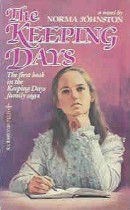 Norma Johnston •
Norma Johnston •
The Keeping Days •
The Keeping Days opens this finely crafted series based on family lore and using first-person narration to conjure all the intensity and heartbreak of deeply felt adolescence. They are darker stories than, say, the Betsy-Tacy books, which take place in the same time frame. The sun always seems to shine on Betsy’s Deep Valley; the mood in Yonkers, where Tish Sterling turns 14 in 1900, is less rosy.
Families were large in those days, making for more companionship but also more complications. No one here is a candidate for sainthood—although Mama likes to do her Early Christian Martyr impersonation, grumbling about her children’s selfishness and lack of consideration like a Greek chorus of one. Tempers explode with some regularity, and harsh words get exchanged.
Tish, clear eyed despite her turbulent emotions, keeps a journal where she notes down scenes of anguish along with cherished moments. In The Keeping Days, her brother Ben’s crisis of faith shakes Tish to the core, while scarlet fever places the whole family in quarantine. Bronwyn, the oldest, marries her father’s widowed business partner and acquires a stepson who hides in pantries and turns red if anyone speaks to him.
In the subsequent books, Gramps’s farm—long a haven for the Sterling clan—is sold to outsiders after his death (The Sanctuary Tree). Tish’s best friend, Celinda, suffers beatings from a tyrannical, deranged mother (Glory in the Flower). And Mama gives birth to her seventh child in a blizzard so severe the doctor is unable to reach the house—although busybody Aunt Kate comes sledding in at the bedroom window on a tea tray.
Johnston’s compassionate, realistic storytelling makes this whole series a keeper.






Of course, Johnston was very much influenced by Betsy-Tacy; her first book was dedicated to Maud Hart Lovelace. You are right that this series is much darker and I remember a teen pregnancy which would not have happened in Deep Valley (or, at least, would not have featured prominently in Betsy’s world). As a teen, I thought Yonkers must be a wild place, but 70s YA fiction was full of angst and I think some of it spilled over into this historical fiction series.
Thanks for your thoughtful comments on Norma Johnston. I wasn’t aware of her connection to Lovelace, although both are authors I greatly admire.